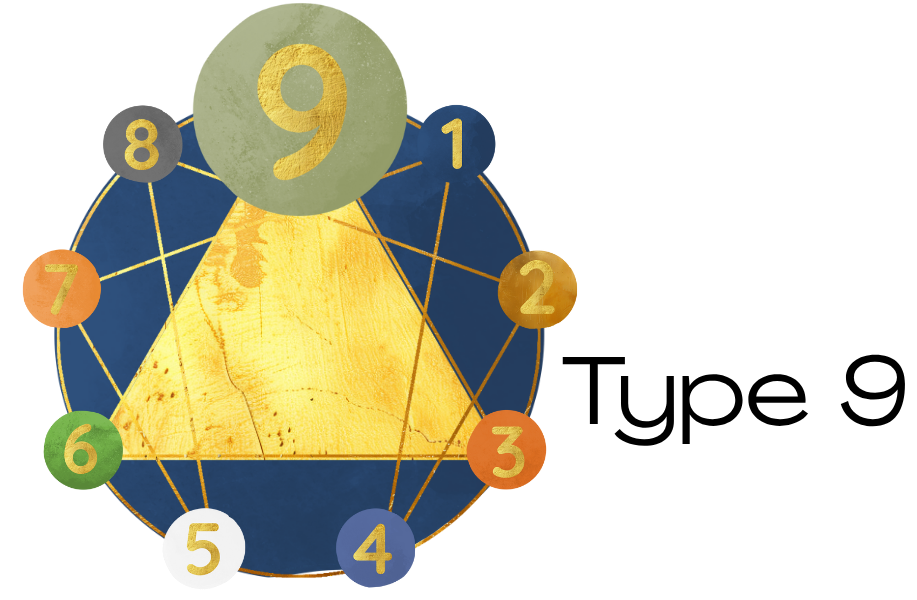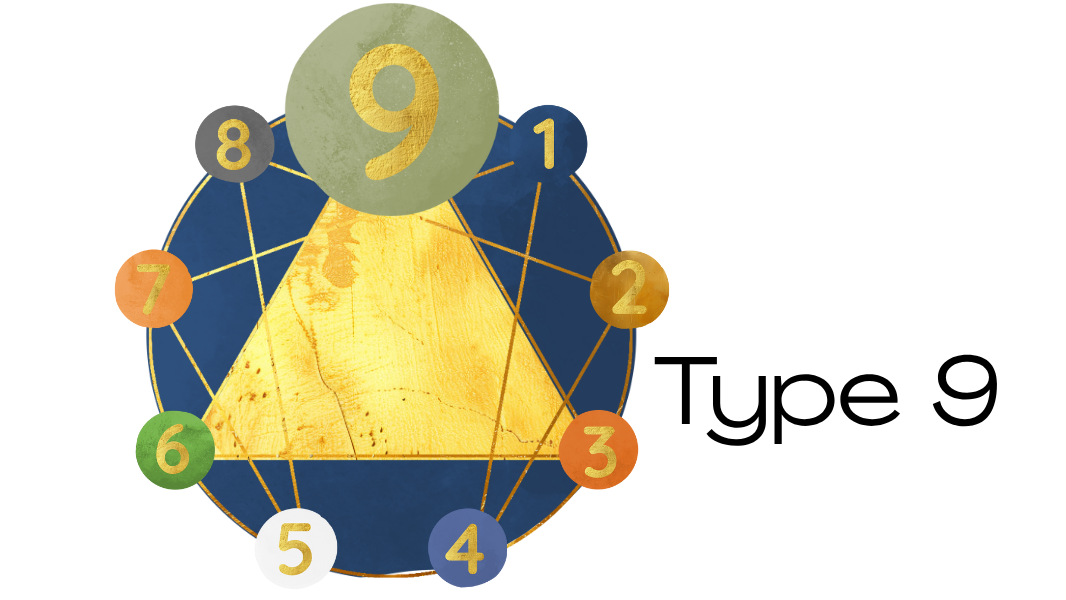
Nines keep the peace, avoid conflict, and stay connected by being agreeable, supportive, and accommodating.
What Drives Type Nine?
Type Nines are motivated by a deep need for harmony, both within themselves and in their relationships. They avoid conflict, prioritise comfort, and merge with others to maintain a sense of inner and outer peace.
Self talk:
“I’m okay as long as everyone around me is okay. I must keep the peace, be accepting, and not make waves.”
Beneath this peacefulness is often a deeper belief:
“My needs don’t really matter. It’s safer to go along than to stand out.”
Core Fear & Desire
- Basic Fear: Of loss, disconnection, or fragmentation
- Basic Desire: To have inner stability and peace of mind
Vice and Virtue
Vice – Sloth (Self-Forgetting):
This isn’t about laziness—it’s about numbing. Nines lose touch with their own priorities, becoming overly accommodating or distracted by less important tasks to avoid discomfort.
Virtue – Right Action:
When Nines awaken to their true desires, they take meaningful, sustainable action aligned with what matters most. Right action arises from presence, not pressure.
Developmental Path: From Numbing to Knowing
| Stage | Developmental View | Nine’s Expression |
|---|---|---|
| Egocentric | “Conflict is dangerous.” | Passive, avoidant, conflict-averse, withdrawn |
| Ethnocentric | “I must keep the peace for everyone.” | Self-sacrificing, supportive, prioritising group harmony |
| Worldcentric | “My voice matters too.” | Balanced, calm, inclusive, shows up with presence |
| Cosmocentric | “Love is the deepest truth.” | Unifying presence, fully alive, takes loving action |
Strengths of the Nine
- Calm and grounding in high-stress situations
- Genuinely supportive and inclusive
- Skilled at seeing multiple perspectives
- Trusts natural timing and process
- Unpretentious and emotionally steady
Challenges for the Nine
- Struggles to assert personal priorities
- Can disengage or procrastinate to avoid discomfort
- May suppress anger or opinions to keep peace
- Can be passive-aggressive when needs are unmet
- Feels overlooked or invisible, even to themselves

Direction of Growth and Stress
Under Stress → Average Type Six:
Nines become anxious, reactive, and suspicious. They blame others, feel overwhelmed, and can lose their usual calm presence.
In Security → Average Type Three:
Nines become more goal-oriented, energetic, and expressive. They share more of themselves and seek to make a meaningful impact.
The Type 9 at Work
Chief Asset: Balance. Nines bring calm, openness, and cohesion. Their presence puts others at ease.
How They Approach Problems:
“Let’s get everyone’s input and find common ground.”
Workplace Belief:
“Things work best when we maintain harmony.”
What They Appreciate in Others
- Optimism and steadiness
- Humility and authenticity
- People who don’t force conflict
What Frustrates Them in Others
- Pushiness or confrontation
- Inconsistency or volatility
- Lack of empathy or respect
How They May Frustrate Others
- Indecisiveness or inaction
- Withdrawing instead of engaging
- Appearing disengaged or unmotivated
- Indirectness or unclear communication
How They’re Often Seen by Others
- Positive: Calm, easy-going, patient, likeable
- Negative: Stubborn, passive, checked-out, avoidant
The Adaptive Peacemaker as a Leader
Strengths:
- Creates a sense of safety and belonging
- Facilitates group harmony and shared decision-making
- Inclusive and relational leader
- Gains respect through steadiness, not status
Challenges:
- Can be indecisive or too accommodating
- May avoid asserting a clear direction or vision
- Difficulty giving direct feedback
Where They Shine: Mediation, group facilitation, team building, people development
Leadership Development Tip:
Your presence matters. Speak up and take the lead—even when it feels uncomfortable. Your calm energy can guide others toward clarity.
Derailers to Watch For
- Passive Aggressiveness: Indirect resistance or avoidance of unpleasant tasks
- Conflict Avoidance: Bottling up tension until it explodes
- Procrastination: Deferring important actions to preserve comfort
- Over-Accommodation: Losing touch with personal priorities
- Self-Minimising: Believing their contributions don’t matter
Growth Invitations for Type 9
- Identify your own priorities and give them voice
- Use anger as a signal—not something to avoid
- Practice healthy conflict and direct feedback
- Say “no” when needed—it honours your integrity
- Take small, consistent action toward what matters
- Notice where you go numb—and gently come back
Keep Growing
Free Subscription
You matter—your presence can change the room.
Your Type Is Showing is a free, type-based email series delivering weekly insights to help you turn numbing and over-accommodation into grounded wisdom and authentic presence.











